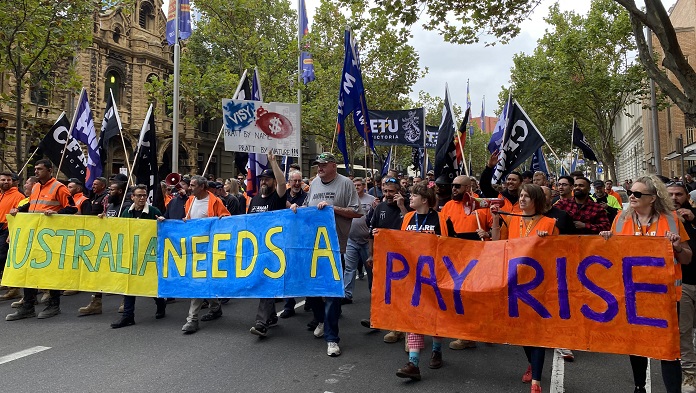Thousands of construction workers took to the streets around the country today, demanding a decent pay rise, an end to the scourge of silicosis and the cancellation of vicious prosecutions against their unions.
Labor last year defunded the anti-union Australian Building and Construction Commission (ABCC), stripping it of its powers and rolling it up, with a handful of left-over staff, into the Fair Work Ombudsman (FWO).
After more than 20 years of the Liberal Party’s pet project of criminalising routine union organising at the taxpayers’ expense, to the benefit of their building company mates, many thought “Good riddance”.
But most construction workers are surprised to find that Labor is allowing the FWO to prosecute the ABCC’s backlog of more than 35 cases against the CFMEU and other building unions.
It’s great that we were out today calling for those cases to be dropped. But our officials knew that the ABCC cases would live on when Labor was changing the law last year. That would have been the best time to take to the streets.
The FWO is the general workplace “watchdog” for union compliance for Australia’s vast array of draconian anti-union laws, some of the harshest in the Western world. The Ombudsman, Sandra Parker, is a graduate of the Australian Institute of Company Directors and on a package of almost $474,000.
The CFMEU is right when it says, “The so-called ‘Fair Work Ombudsman’ is anything but fair. It’s stacked with right-wing Liberal mates and bosses.” It’s always has been like that since Labor set up Fair Work Australia in July 2009 under the Rudd Government, subject to political appointments by the government of the day.
Routine union organising and strike action is still complicated by legal hoop-jumping or illegal under the Fair Work Act created by Labor.
Travesty
Both the FWO and the Fair Work Commission (FWC) say they are “independent” yet they are fully-funded by the federal government. FWC operates under the portfolio of the Attorney-General, Mark Dreyfus, and the FWO operates under the Minister of Workplace Relations, Tony Burke. So Labor ministers control both bodies.
The fact that a “reforming government” has let the total abolition of the ABCC slip off its agenda rightly angers many CFMEU members. And that Labor allows the ABCC to pursue its legal prosecution agenda inside the FWO is a travesty.
For more than 20 years, the CFMEU has put its faith in the election of a Labor government as the way to abolish the ABCC, only mobilising union members for occasional set-piece strikes and protests against it, much like today.
Yet Labor governments under Rudd and Gillard from 2007 to 2013 didn’t end the ABCC. Now we have an Albanese government and the zombie-like ABCC is dead but not buried.
The union has never been willing to seriously target building companies that call in the ABCC during industrial disputes, nor has it sought to escalate strikes against them into company-wide ones leading to a national construction strike.
That is what is needed to get the point across to the new Labor Government and the building company bosses—we mean business and they will pay for using the law against us.
This underscores the need for workers to take back the right to strike.
Today is a good start, but it can’t be a one-off set-piece strike and protest. The unions should refuse to pay any fines imposed by the Ombudsman. We need more strike days and protests, and soon, to strike the UnFair Work Ombudsman and the anti-union laws into the skip of history.
By a CFMEU member






